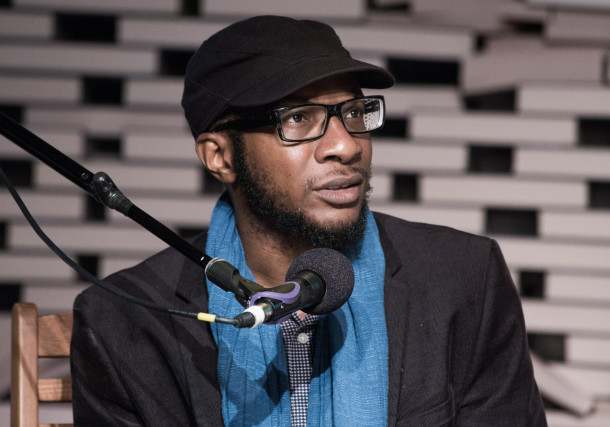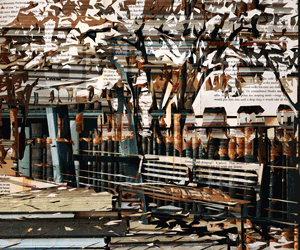Sodobna nigerijska proza IV: Teju Cole
Danes se posvečamo enemu izmed mlajših avtorjev, ki so »nekje vmes«, katerih življenja so bila ali pa so še vedno, razpeta med Nigerijo in Zahodom, kjer bodisi študirajo ali pa so se tam tudi ustalili. V to skupino lahko prištejemo denimo Chimamando Ngozi Adichie, ki smo jo v preteklih delih cikla že nekajkrat omenili. Adichie je rojena v Nigeriji, z devetnajstimi leti pa se je preselila v ZDA, kjer je začela študij, tam pa je tudi ostala. Izkušnja razpetosti med dvema svetovoma pa odločilno vpliva tudi na njeno pisanje, kar je opazno predvsem v njenem zadnjem romanu, Amerikanka, v katerem popisuje izkušnjo zdomstva, integracije v novo okolje ter nov način življenja, ki ga tam prevzema.
Podobna izkušnja je skupna tudi Teju Coleju, čigar prozi bomo prisluhnili danes. Teju Cole se je staršema, ki izhajata iz nigerijskega plemena Yoruba, rodil leta 1975 v ZDA, nato pa je otroštvo preživel v Lagosu. Leta 1992 se je Cole pri sedemnajstih vrnil nazaj v Združene Države, kjer je najprej študiral medicino, nato pa se preusmeril v umetnostno zgodovino, iz česar je tudi doktoriral. Je avtor dveh knjig, romana Open City ter novele Every Day is for the Thief. Danes živi v New Yorku, poleg pisanja se ukvarja s fotografijo in umetnostno zgodovino, je reden pisec za New York Times Magazine ter the New Yorker.
Colejev roman Open City je kot njegov prvenec izšel leta 2012, zanj pa je prejel kopico nagrad in priznanj. Njegova druga knjiga, novela Every Day is for the Thief, odlomku iz katere bomo prisluhnili danes, je sicer v Nigeriji izšla že leta 2007, a je z izdajo v ZDA v lanskem letu požela prav toliko občudovanja, kot poprej Open City. Tako kot v prvi knjigi, gre tudi v drugi za iskanje svojih poti in zapisovanje opazovanj v velikem mestu. Če je v prvi junak Julius popisoval svoja opažanja in srečevanja v Manhattanu in Bruslju, gre v omenjeni noveli za Lagos.
V Every Day is for the Thief tako prebiramo skupek pripovedi, ki so sestavljene iz trideset blogov, ki jih je Cole zapisal ob svojem ponovnem obisku Nigerije po skoraj petnajstih letih odsotnosti. V delu gre sicer za podobno postopajočega meditativnega pripovedovalca. Fragmentarne zgodbe in spomini, navidezno nepovezane refleksije, naključna srečevanja, so popisana z očesom za fotografske detajle. Knjiga ima izrazito nelinearno pripovedno strukturo, Cole pa zavrača podreditev kateremukoli žanru in tako slogovno svobodno prehaja med esejem, reportažo, romanom in še čem. Cole je izjemno radoveden in pronicljiv, v pisanju pa predihava predvsem svojo pre-okupacijo z mestom, ljudmi, opazovanjem. Čeprav se izogiba romantiziranju, je slog pogosto prav brezsramno poetičen. Pripovedovalec je v stalnem pogovoru z mestom, ki ga obdaja, in zazdi se, da je prav mesto, v svojih vročičnih, a tudi bolehnih antagonizmih, ki skrivajo globlje kulturno-politične mehanizme, glavni protagonist pripovedi, naslovljene z yoruba pregovorom, ki pravi: »Vsak dan je za tatu, a en dan je za lastnika« in namiguje na vseprisotno korupcijo in zvijačnostjo kot načinom življenja.
///////////////////Odlomku iz avtorjeve novele Every Day Is for the Thief lahko prisluhnete v posnetku oddaje./////////////////////
Cole ob napadu na uredništvo Charlie Hebdo v The New Yorkerju: Unmournable Bodies
Cole v The New York Times Magazine o fotografiranju črnih teles: A True Picture of Black Skin
Odlomek iz Colejevega članka iz The New Yorkerja: Black Body: Rereading James Baldwin’s “Stranger in the Village” :
"There’s no world in which I would surrender the intimidating beauty of Yoruba-language poetry for, say, Shakespeare’s sonnets, nor one in which I’d prefer the chamber orchestras of Brandenburg to the koras of Mali. I’m happy to own all of it. This carefree confidence is, in part, the gift of time. It is a dividend of the struggle of people from earlier generations. I feel no alienation in museums. But this question of filiation tormented Baldwin considerably. He was sensitive to what was great in world art, and sensitive to his own sense of exclusion from it. He made a similar list in the title essay of “Notes of a Native Son” (one begins to feel that lists like this had been flung at him during arguments): “In some subtle way, in a really profound way, I brought to Shakespeare, Bach, Rembrandt, to the Stones of Paris, to the Cathedral at Chartres, and the Empire State Building a special attitude. These were not really my creations, they did not contain my history; I might search them in vain forever for any reflection of myself. I was an interloper; this was not my heritage.” The lines throb with sadness. What he loves does not love him in return.
This is where I part ways with Baldwin. I disagree not with his particular sorrow but with the self-abnegation that pinned him to it. Bach, so profoundly human, is my heritage. I am not an interloper when I look at a Rembrandt portrait. I care for them more than some white people do, just as some white people care more for aspects of African art than I do. I can oppose white supremacy and still rejoice in Gothic architecture. In this, I stand with Ralph Ellison: “The values of my own people are neither ‘white’ nor ‘black,’ they are American. Nor can I see how they could be anything else, since we are people who are involved in the texture of the American experience.” And yet I (born in the United States more than half a century after Baldwin) continue to understand, because I have experienced in my own body the undimmed fury he felt about pervasive, limiting racism. In his writing there is a hunger for life, for all of it, and a strong wish to not be accounted nothing (a mere nigger, a mereneger) when he knows himself to be so much. And this “so much” is neither a matter of ego about his writing nor an anxiety about his fame in New York or in Paris. It is about the incontestable fundamentals of a person: pleasure, sorrow, love, humor, and grief, and the complexity of the interior landscape that sustains those feelings. Baldwin was astonished that anyone anywhere should question these fundamentals, thereby burdening him with the supreme waste of time that is racism, let alone so many people in so many places. This unflagging ability to be shocked rises like steam off his written pages. “The rage of the disesteemed is personally fruitless,” he writes, “but it is also absolutely inevitable.”"
Prevod: Petra Meterc
Intepretacija: David, Želc






















Prikaži Komentarje
Komentarji
Alright !! :) Se veselim !
:) same here-ooo!
isti k Mos Def
Poetry makes nothing happen ;), odličen prispevek. Teju Cole obeta, tenks !!!
Hvala! Coleja pa čimprej na bralni seznam ;)
Komentiraj